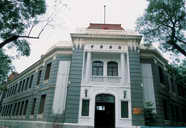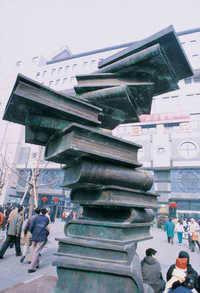 The summer holiday has come, but there are still many students burying their heads to books in universities. And you can see in many universities that hundreds of students crowded in a big class rooms or lecture halls listening to lectures, which can rarely be seen in the semester. They are students preparing for postgraduate examinations of this year or even next year.
The summer holiday has come, but there are still many students burying their heads to books in universities. And you can see in many universities that hundreds of students crowded in a big class rooms or lecture halls listening to lectures, which can rarely be seen in the semester. They are students preparing for postgraduate examinations of this year or even next year.
If you asked 10 undergraduates in Beijing about their ideal educa-tional background, six of them would tell you it is "a master's degree," three would say "doctorates," and only one would be satisfied with a bachelor's.
Students started to prepare for the postgraduate education admission exam for the 2003 academic year when the 2002 exam had just been over. Information on all sorts of classes providing specialized guidance and tutorship fills campuses and websites and billboards near colleges. Many students who want to get assistance crowdsintosthese classes in universities and colleges. Students, universities and colleges, enterprises and institutions all have their own opinions about the craze for higher academic attainments.
Undergraduate students
Many undergraduate students regard the great difficulty in finding employment as the main reason for the frenzy. China has largely increased the college students enrolling rate. The gross number of college students grows rapidly. Owing to various reasons, it seems that undergraduates are oversupplied.
"There are too many undergraduates, so it's difficult to find good jobs," according to an undergraduate student from the Beijing Normal University. "Pursuing further education is better than wasting several years just working somewhere leading a vain and humdrum life."
The student said he wanted to be "higher qualified" after confronting the talent market in the years after graduation. Many postgraduate students agree that the talent market always favors those with a higher educational background, so it is better to receive higher education earlier in this regard.
Since nearly all the Chinese universities and colleges have enlarged their enrollment, it will be more difficult for the undergraduates who study in those schools which are not very famous to find a good job. So they want to pursue higher education to make them more competitive.
"There are many reasons for the craze for higher academic attainments," said Lin Shanyuan, an official from the China Geology University. "Easing employment pressure is one of them, and the other important reason is that students are aware of their lack of major knowledge. During the four undergraduate years, the first two years are spent studying English and preparing for the band tests, the fourth year is spent job hunting. So there is only one year for major study, which is apparently not enough."
It is worth noticing that more than half of the people preparing for postgraduate exam have working experience. Some of them are not satisfied with their current jobs and want to find more preferable jobs after they get master's degree. Some of them feel their knowledge not sufficient and want to get further education systematically. Some of them quit their jobs; the others choose to study after work.
They are even some students who choose not to work after graduation. They have taken the exam in their fourth year, but unfortunately failed. They choose to try again for half year after their graduation. They rent houses beside universities or evensgroupsa bed in some basement inns.
Li Guozhong, an officer in charge of job placement for graduates at Peking University, regarded the fever for higher academic attainment as a positive phenomenon that reflects young people's demands for a higher level of competence. About 40 percent of graduating undergraduate students at Peking University goes on to study for masters' degrees in China, and more than 20 percent do so abroad.
According to statistics, there are 1.08 million graduating university students and 70,000 postgraduate students this year. These numbers will grow to 1.65 million and 120,000 respectively in 2003; and 2.02 million and 150,000 in 2004, double this year's numbers. Undergraduate education was once known as education for the talented, but now it's only part of mass education, national education.
The school
The educational mechanism for postgraduate students is very different from that for undergraduates, especially in science and engineering majors,swheresbetter laboratory equipment and direction from more teachers of great attainments are provided for postgraduate students, Lin said. That's the reason why postgraduate students, generally speaking, are academically more competent than undergraduates. There is another reason that should be paid attention, "Education for postgraduate students is still partially government-funded now, so some people want to catch the last chance," Lin added.
The employer
Postgraduate education is a trend, and more opportunities are provided as enrolment has continued to expand in recent years. But another problem rises; some units have a blind demand for high educational background when they have too many choices for a post. The whole employment market has been overpriced, causing waste in human resources.
Lin, however, regarded the "luxurious consumption of talent" as the result of market forces, which reflects the market's greater support and respect for talented personnel.
A human resources manager from Beijing said companies always want new staff to work as soon as they are recruited. Undergraduate students possess only the most basic talent, while most postgraduates can take the lead in certain fields of work. That is the reason why so many enterprises clearly state that "postgraduate students are the priority" during recruitment. Of course, educational background is only one factor in grading personnel.
Undergraduate students with good personal qualities can be accepted and trained later. The follow-up training provided by enterprises for newly recruited undergraduates is very important, but it costs. Recruiting postgraduates actually transfers some of the training expenses to society and individuals, Lin said. "When there is no obvious difference in salary for undergraduates and postgraduates, why not use the latter?" he asked.
As the number of postgraduate students increases, the undergraduates should avoid crowdingsintosonly one field. Ideas about selecting a career should be changed. Don't think too highly of yourselves. Many developing careers, like community service, still need lots of qualified personnel.
Xu Youchun from the Tsinghua Enterprisesgroupsagreed with Li in this respect. Qualified personnel are deficient in number and irrationally distributed across the nation. For example, there is an urgent demand for university graduates in China's western region, but not many are willing to go there, Xu said. He hopes postgraduate students begin their careers in placesswheresthey can give full play to their professional knowledge.
Postgraduate Examination and Education
 The exam is dividedsintostwo parts. One is called preliminary exam, they other is called retrial exam. Only those who passed the first try can take the second part. The fist try is held nation wide while the second is in the school the candidates apply for.
The exam is dividedsintostwo parts. One is called preliminary exam, they other is called retrial exam. Only those who passed the first try can take the second part. The fist try is held nation wide while the second is in the school the candidates apply for.
The candidates register their names and fill the application from November 10 to 14.The preliminary exam holds every January; the test subjects vary with colleges and disciplines. Usually, three test papers are compulsory while two papers are selective. Among which foreign languages, mathematics and political knowledge are set and printed unified by the National Test Center under the National Education Ministry. The retrial exam is held in the universities or institutions the candidate apply for and the test paper are designed by the teachers in the universities or institutions.
Postgraduate education is making unprecedented strides. Before 1949,China's high-grade specialists were mainly trained in foreign countries, the scale of domestic postgraduate education was very small, as a handful of higher-education schools enrolled a limited number of graduates and granted about 200 master's degrees altogether throughout all the pre-Liberation period, and no doctorates were offered. After 1978, China's educational and scientific undertakings developed in an all-round way, and postgraduate education gradually entered a new stage of vigorous development. In 1978, some 63,000 people entered for graduate admission examinations, and 10,000 were recruited. In 1998, a total of 8,957 students received doctorates, and 38,051 master's degrees.
Today, China has managed to establish a postgraduate education system fundamentally comprehending all disciplines and an academic degree system wherein the quality of the training can be guaranteed. This has promoted the fostering and growth of high-grade specialized talents, and given an impetus to scientific research and discipline development in institutions of higher education and scientific research.
While admitting foreign students, China also send students to study abroad every year. In 1998, China received 43,084 students from 164 countries and the students it sent to study abroad exceeded the 23,000-mark.

![]() 本网站由北京信息港提供网络支持
本网站由北京信息港提供网络支持
 The summer holiday has come, but there are still many students burying their heads to books in universities. And you can see in many universities that hundreds of students crowded in a big class rooms or lecture halls listening to lectures, which can rarely be seen in the semester. They are students preparing for postgraduate examinations of this year or even next year.
The summer holiday has come, but there are still many students burying their heads to books in universities. And you can see in many universities that hundreds of students crowded in a big class rooms or lecture halls listening to lectures, which can rarely be seen in the semester. They are students preparing for postgraduate examinations of this year or even next year. The exam is dividedsintostwo parts. One is called preliminary exam, they other is called retrial exam. Only those who passed the first try can take the second part. The fist try is held nation wide while the second is in the school the candidates apply for.
The exam is dividedsintostwo parts. One is called preliminary exam, they other is called retrial exam. Only those who passed the first try can take the second part. The fist try is held nation wide while the second is in the school the candidates apply for.